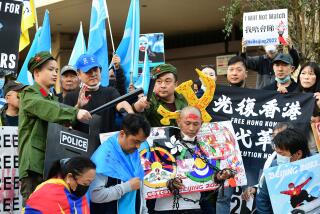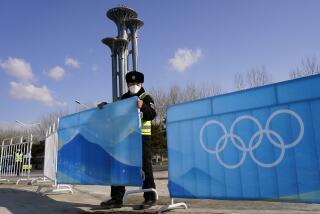Beijing Puts on Its Best Games Face
- Share via
BEIJING — An Olympic inspection team wound up a four-day visit here Saturday with an upbeat appraisal of Beijing’s bid to host the 2008 Games.
“I think we’ve got a fairly good picture of the city,” the team’s leader, Hein Verbruggen, said at a news conference. “We have found great public support here.”
The positive assessment appeared to strengthen the Chinese capital’s status as a front-runner in the bidding for the Olympics. The inspectors will report their findings to the International Olympic Committee, which will convene in Moscow in July to pick a winner from among the five candidates: Beijing; Osaka, Japan; Istanbul, Turkey; Toronto; and Paris.
Eager for the prestige of hosting the event, China is banking on several factors: the world’s largest population, a rich cultural heritage and an emerging presence as a sports superpower. So far, only two Asian cities--Tokyo in 1964 and Seoul in 1988--have hosted the Summer Games.
In recent days, Beijing officials accompanied the inspectors on visits to the city’s new traffic control center, a sewage treatment plant, hospitals, schools and sports venues. The team drove through streets decked out with banners, freshly painted guardrails and winter grass dyed a bright green.
The city has also launched a bevy of publicity-generating events and initiatives in support of its bid, from a parade of 10,000 bicyclists on Saturday to English classes for residents and taxi drivers. Polls commissioned by the International Olympic Committee have found that more than 90% of Beijing residents support the bid.
In 1993, China lost its bid for the 2000 Olympics, which went to Sydney, Australia, by two votes. The loss sparked a wave of nationalism and resentment against the United States, where some politicians critical of China’s human rights record had opposed the bid.
China now claims that its human rights situation has improved and will improve further if Beijing is selected to host the Games in seven years. At the same time, the government argues that critics are wrong to mix sports and politics.
But China continues to draw criticism for its treatment of dissidents and the Falun Gong spiritual group, and California Rep. Tom Lantos (D-San Mateo) plans to introduce legislation opposing Beijing’s latest bid, an aide said last week.
Human rights groups reported last week that Beijing dissidents were detained or put under surveillance to keep them from contacting Olympic officials.
In their bid proposal, Beijing officials pledged to invest $20 billion in infrastructure projects, tripling the length of the city’s expressways and adding a subway line, a light-rail system and dozens of sporting venues before the 2008 Olympics.
Officials connected with the bid touted the plan as “one of the greatest building projects undertaken in China since construction of the Great Wall” and said it would permanently improve the quality of life for the city’s 12 million residents.
Beijing officials promised to spend $12 billion more in the next decade to clean up the city’s environment and make its notoriously smoggy air cleaner than Paris’ by 2008. They have also lavished unprecedented attention on China’s fledgling environmental groups, enlisting them as consultants to the bid effort.
But some environmentalists question the proposed spending spree.
Yang Dongping of Friends of Nature argues that Beijing has concentrated too many urban functions in one place, as if combining Boston, New York and Washington in a single city.
“Beijing’s functions don’t need to be strengthened any further,” Yang said. “Instead, they need to be dispersed to other areas to relieve the pressure on Beijing’s environment.”
More to Read
Go beyond the scoreboard
Get the latest on L.A.'s teams in the daily Sports Report newsletter.
You may occasionally receive promotional content from the Los Angeles Times.






